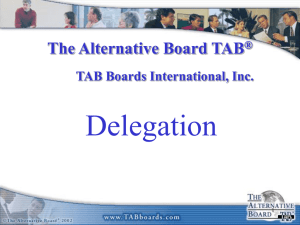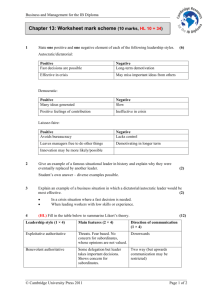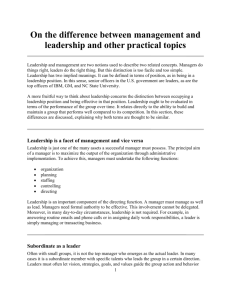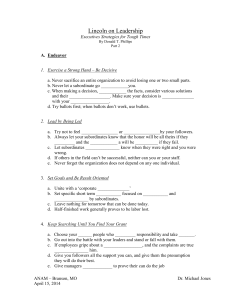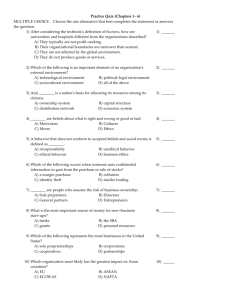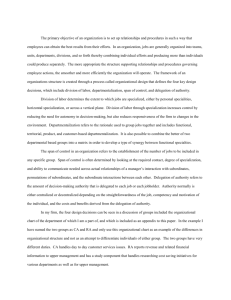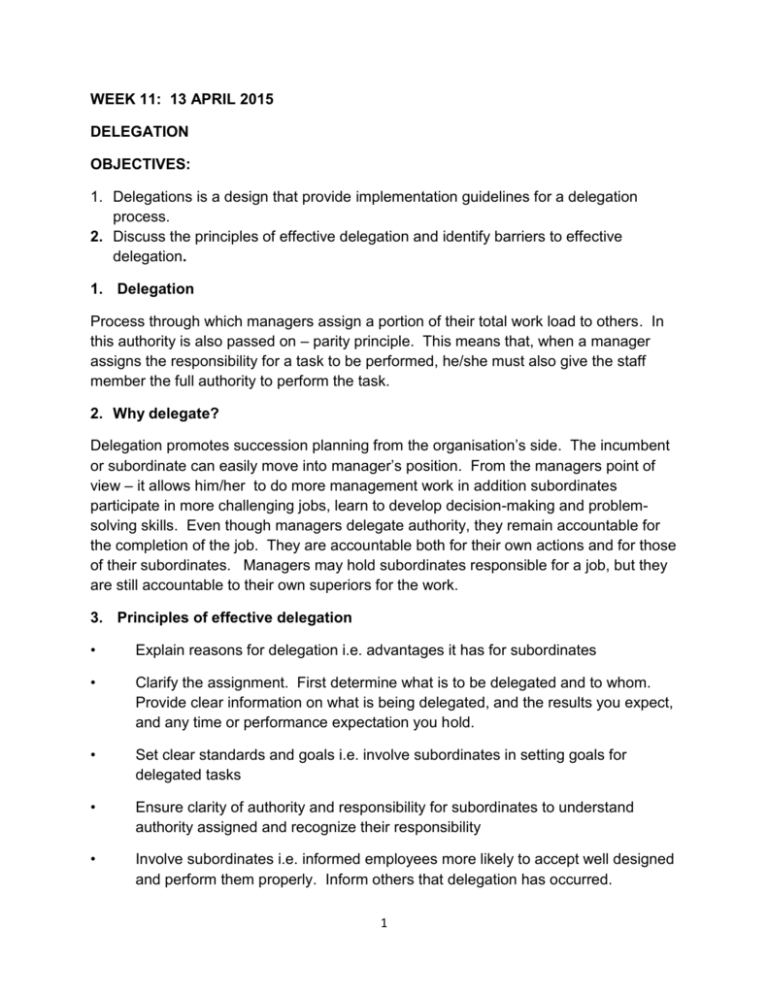
WEEK 11: 13 APRIL 2015
DELEGATION
OBJECTIVES:
1. Delegations is a design that provide implementation guidelines for a delegation
process.
2. Discuss the principles of effective delegation and identify barriers to effective
delegation.
1. Delegation
Process through which managers assign a portion of their total work load to others. In
this authority is also passed on – parity principle. This means that, when a manager
assigns the responsibility for a task to be performed, he/she must also give the staff
member the full authority to perform the task.
2. Why delegate?
Delegation promotes succession planning from the organisation’s side. The incumbent
or subordinate can easily move into manager’s position. From the managers point of
view – it allows him/her to do more management work in addition subordinates
participate in more challenging jobs, learn to develop decision-making and problemsolving skills. Even though managers delegate authority, they remain accountable for
the completion of the job. They are accountable both for their own actions and for those
of their subordinates. Managers may hold subordinates responsible for a job, but they
are still accountable to their own superiors for the work.
3. Principles of effective delegation
•
Explain reasons for delegation i.e. advantages it has for subordinates
•
Clarify the assignment. First determine what is to be delegated and to whom.
Provide clear information on what is being delegated, and the results you expect,
and any time or performance expectation you hold.
•
Set clear standards and goals i.e. involve subordinates in setting goals for
delegated tasks
•
Ensure clarity of authority and responsibility for subordinates to understand
authority assigned and recognize their responsibility
•
Involve subordinates i.e. informed employees more likely to accept well designed
and perform them properly. Inform others that delegation has occurred.
1
•
Request the completion of tasks i.e. giving proper direction will allow mangers to
see that employees complete their tasks
•
Provide performance training – continually evaluate responsibilities delegated
and provide training to help workers overcome shortcomings
•
Provide feedback to the subordinates – time and accurate feedback – negative
and positive
NOTE: Delegate tasks you know best
4. Advantages of delegation
•
Managers train their staff to accept more responsibility in position to accept more
responsibility from higher levels of management
•
Encourages employees to exercise judgment and accept accountability
•
Better decisions are taken by involving employees who are closer to the action
•
Quicker decision making takes place
5. Obstacles to effective delegation: Personal and Psychological barriers
•
Manager fears that his performance evaluation will suffer if subordinates fail to do
their jobs
•
The manager may feel that the subordinate will not do the job as well as he or
she can do it. This may stem from a lack of confidence in subordinates and the
perception that they are not up to doing the job.
•
Managers are inflexible and disorganised/sometimes they feel it takes too long to
explain
•
Fear that subordinates will do job better than they can.
6. Obstacles to effective delegation Organisational impediments to delegation
•
Sometimes the current design of the organisation is an impediment to delegation
•
Delegation is not effective if authority and responsibility are not clearly defined
•
Manager not making subordinates accountable for task performance
•
Absence of or poorly developed job descriptions.
2
7. How to overcome obstacles to effective delegation
Awareness of manager that such impediments/ obstacles exist.
Create a culture of continuous learning- NB in volatile bus. Environment.
Not to compel subordinates to apply their methods – more then one way to deal
with a situation.
Improve communication between managers and subordinates- NB to identify
weaknesses and strengths of staff.
Make subordinates aware of the extent of their contribution in achieving goals –
to what extend are subordinates capable of completing tasks successfully.
8. Delegation process
•
Process is essential to the manager, for growth and the well-being of
subordinates
•
Process:
•
Decide on tasks to be delegated – ones you know best
•
Decide who should perform the task-look at time available, competency required,
experience required
•
Provide sufficient resources to carry out delegated task i.e. people resources,
finance, physical etc.
References
Smit, P.J., Cronje, G. J., Brevis, T., Vrba, M. J. (2011). Management principles. A
contemporary edition for Africa. (5th ed.). Cape Town, Juta.
Robbins, S. P, DeCenzo, D. A. (2005). Fundamentals of Management: essentials
concepts and applications. (5th Ed.d.). New Jersey, Pearson Prentice Hall.
3

